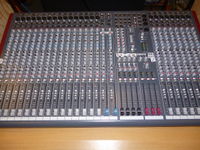Allen and Heath ZED 428: Difference between revisions
David.heaton (talk | contribs) (Tried to make it a bit more accessible. Not sure if it worked. Feel free to improve. I'll write a basic operation and troubleshooting guide soon.) |
m (actually has 4 stereo inputs - but only 2 fader channels. and i've never got the LRM inserts working, so doesn't use them) |
||
| Line 1: | Line 1: | ||
[[File:ZED_428.jpg|thumb|right|200px|The Allen and Heath ZED 428]] | [[File:ZED_428.jpg|thumb|right|200px|The Allen and Heath ZED 428]] | ||
The ZED 428 is a 28 channel (24 mono + | The ZED 428 is a 28 channel (24 mono + 4 stereo) analogue mixing desk with 4 groups, 6 auxilary (aux) outputs, 2 matrices, and left, right and mono outputs (LRM). This is the main audio desk used in the studio. The power switch can be found by reaching down the back right of the mixer. It's round. | ||
== Key Specifications == | == Key Specifications == | ||
*24 mono inputs | *24 mono inputs | ||
* | *4 stereo inputs | ||
*4 mono groups (can be configured as 2 stereo groups) | *4 mono groups (can be configured as 2 stereo groups) | ||
*3 main outputs (LRM) | *3 main outputs (LRM) | ||
| Line 12: | Line 12: | ||
*Phantom power individually selectable on each mono channel | *Phantom power individually selectable on each mono channel | ||
*Signal and peak indicators on each channel | *Signal and peak indicators on each channel | ||
*2-track in | |||
*2-track out | |||
*USB connections | |||
== Usage == | == Usage == | ||
=== Studio === | === Studio === | ||
Being the biggest, newest, shiniest audio desk we have, it is naturally used as our studio desk. Typically, two [[Compressor|compressors]] are | Being the biggest, newest, shiniest audio desk we have, it is naturally used as our studio desk. Typically, two [[Compressor|compressors]] are connected to the L+R outputs, with more compressors inserted into each microphone channel using the helpfully named 'INSERT' sockets. The matrices outputs feed the control room amplifier, and any two of auxes 3-6 can be used to feed the studio amp if 3+4 are switched to post-fader. The [[computing:VT Server | VT server]] (magic video box), [[Ystvedit2 | edit desk]], [[Computing:IMac | Mac]], and whatever else we happen to be using to play [[hist:University Radio York|URY]] on are usually connected to the desk in stereo - either through a stereo channel (blue fader) or a pair of mono channels with their "pan" knobs turned fully left and fully right. | ||
=== OBs === | === OBs === | ||
| Line 37: | Line 40: | ||
[[Category:Audio]] | [[Category:Audio]] | ||
[[Category:Equipment]] | [[Category:Equipment]] | ||
Revision as of 10:02, 6 October 2013
The ZED 428 is a 28 channel (24 mono + 4 stereo) analogue mixing desk with 4 groups, 6 auxilary (aux) outputs, 2 matrices, and left, right and mono outputs (LRM). This is the main audio desk used in the studio. The power switch can be found by reaching down the back right of the mixer. It's round.
Key Specifications
- 24 mono inputs
- 4 stereo inputs
- 4 mono groups (can be configured as 2 stereo groups)
- 3 main outputs (LRM)
- 6 auxiliary outputs (2 pre-fade, 2 post-fade, 2 switchable)
- 2 matrix outputs (mixes groups and LRM)
- 4-band equalisation (or EQ, frequency-specific volume control) on each channel (sweepable/semi-parametric mid bands on the mono channels)
- Phantom power individually selectable on each mono channel
- Signal and peak indicators on each channel
- 2-track in
- 2-track out
- USB connections
Usage
Studio
Being the biggest, newest, shiniest audio desk we have, it is naturally used as our studio desk. Typically, two compressors are connected to the L+R outputs, with more compressors inserted into each microphone channel using the helpfully named 'INSERT' sockets. The matrices outputs feed the control room amplifier, and any two of auxes 3-6 can be used to feed the studio amp if 3+4 are switched to post-fader. The VT server (magic video box), edit desk, Mac, and whatever else we happen to be using to play URY on are usually connected to the desk in stereo - either through a stereo channel (blue fader) or a pair of mono channels with their "pan" knobs turned fully left and fully right.
OBs
This desk is often used for the larger OBs, mainly due to the unavailability of other mixers in the station. To aid in this (and to increase the life of the desk) there is a flight case for it. Please use it. In addition, the Technical Director must be informed if this desk is leaving the station for any reason.
Notes
USB
There is a USB-B port located on the desk. Without other software on the connected computer, the desk is configured as a recording/listening device - allowing for recording from the desk or playing out to the desk (possibly at the same time). Other options are possibly available with the right software, but this has yet to be checked.
Software
Included with the desk was a copy of some software, possibly SONAR LE - the CD should be somewhere within the technical stuff...
Other desks on campus
BandSoc also has one of these desks, which we have borrowed on occasion (Woodstock 2013). Just useful to know if a second one is needed.
